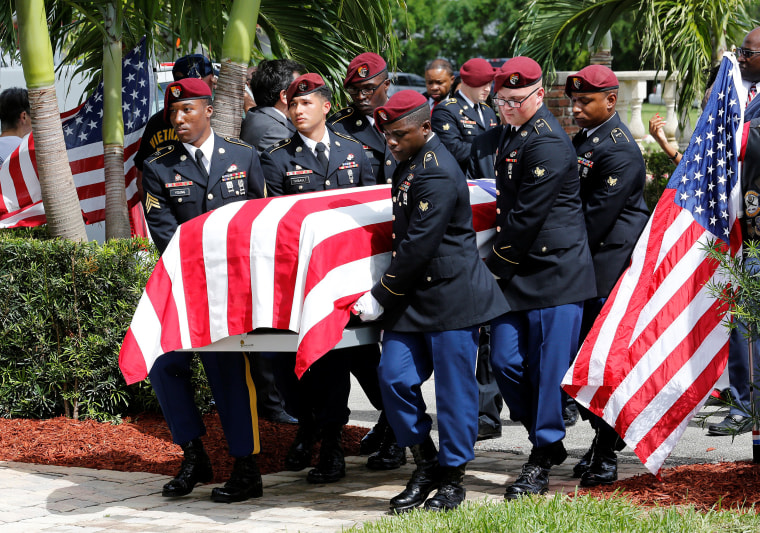No further disciplinary action will be taken in response to two ambushes in 2017 in which four U.S. Special Forces soldiers were killed in Niger, defense officials said Wednesday as the military approved awards for valor for the personnel who were attacked.
Several military officials have previously been reprimanded in connection with the ambushes on Oct. 4, 2017, in the Niger village of Tongo Tongo. In addition to the four Americans, four Nigerien personnel were killed as they sought a militant linked to ISIS, U.S. officials have said.
A Defense Department investigation initially cited organizational failures and a lack of sufficient training in the ambushes on the U.S.-Niger team, which occurred within an hour of each other in hails of small arms and machine gun fire.
Acting Defense Secretary Patrick Shanahan ordered a new review of the incident after he took office in January. Previous reviews had largely left senior officers in the chain of command unscathed.
Shanahan said in a statement Wednesday that he had concluded that no other sanctions were necessary.
Read the latest Defense Department report on the Niger attack
Owen West, the assistant secretary of defense for special operations and low-intensity conflict, said: "The department is absolutely confident after two investigations and three reviews that accountability has been rendered in this case."
A senior defense official, speaking on condition of anonymity, acknowledged that the Special Forces team was "caught by surprise" but said that because of reforms instituted after the attack, "a team would not be in that position" now.
The official said only half of the Niger team had trained together before the attack in an "emergency room-like model" of sending Special Forces in at the last minute without what's called validating and culminating training. In the future, teams will go through the exercises together before deployment, the official said.
Rep. Ruben Gallego, D-Ariz., a member of the Armed Services Committee, criticized what he called Shanahan's decision to "let the blame for the Niger disaster lie on junior officers and enlisted personnel."
"From the beginning, the investigation into what happened that day has been poorly handled at all levels. Nearly two years later, we are still waiting for answers," Gallego said.
But in a statement late Wednesday, Shanahan said he was satisfied that the right officials were being held accountable and that recommended reforms had been adopted.
Shanahan said the personnel who were attacked weren't at fault, stressing that they had fought "valiantly" against "a numerically superior, heavily armed force."
The Defense Department said it was bestowing nine valor awards on the U.S. team:
- Sgt. 1st Class Jeremiah W. Johnson and Staff Sgt. Bryan C. Black will be awarded the Bronze Star Medal with "V" device posthumously.
- Staff Sgt. Dustin M. Wright and Sgt. La David Johnson will receive the Silver Star posthumously, as will two other members of the team who survived.
- A Bronze Star Medal with "V" device, an Army Commendation Medal with "V" device and an Army Commendation Medal with "C" device would also be awarded, although the Defense Department didn't say to whom.

